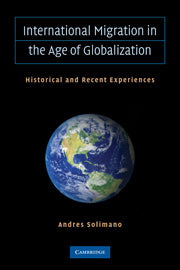Freshly Printed - allow 8 days lead
Couldn't load pickup availability
International Migration in the Age of Crisis and Globalization
Historical and Recent Experiences
This book provides the why, who, and how of international migration, explaining how it affects the jobs, wages, and welfare of people.
Andrés Solimano (Author)
9780521194259, Cambridge University Press
Hardback, published 5 July 2010
240 pages, 11 b/w illus. 19 tables
22.9 x 15.5 x 2.3 cm, 0.52 kg
"Andres Solimano adds to a burgeoning literature a highly readable book on the motivations for international migration and the consequences for both sending and receiving countries.... This book will be particularly useful for students and researchers seeking to understand immigration patterns in the context of globalization." - Madeline Zavodny, Agnes Scott College, Journal of Economic Literature
The international mobility of people and elites is a main feature of the global economy of today. Immigration augments the labor force in receiving countries and provides many of the bodies and minds that are essential to any vibrant economy. This book is based on a blend of theory, varied country examples, and rich historical material ranging from the mid-nineteenth century to the early twenty-first century. It discusses the conceptual underpinnings of the push and pull factors of current migration waves and their impacts for development on the source and receiving countries. The analysis reviews the historical context under which various migration experiences have taken place - both in periods of internationalism and nationalism - in order to contribute to debates on the desirability of and tensions and costs involved in the current process of international migration.
1. Introduction: understanding the trends, themes, and strata of international migration
2. Why people move or stay put: international migration is the result of compelling and conflicting factors
3. What happens when international migration happens? The dilemmas posed by migration
4. How empires, policy regimes, and economic imperatives influenced the mobility of capital and people in the 20th century
5. Latin America: where volatile economic development, political crises, poverty, and remittance income is a laboratory for studying the determinants of international migration
6. Who migrates and what they offer: a focus on people and elites with talent, knowledge, and entrepreneurial skills
7. International migration requires that the global community put it effectively on its agenda.
Subject Areas: Economic history [KCZ], Political economy [KCP], Development economics & emerging economies [KCM], Economics, finance, business & management [K], Political science & theory [JPA], Globalization [JFFS], Migration, immigration & emigration [JFFN]


